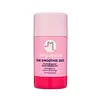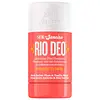What's inside
What's inside
 Key Ingredients
Key Ingredients

 Benefits
Benefits

 Concerns
Concerns

 Ingredients Side-by-side
Ingredients Side-by-side

Caprylic/Capric Triglyceride
MaskingMaranta Arundinacea Root Powder
Skin ConditioningStearyl Alcohol
EmollientMagnesium Hydroxide
AbsorbentButyrospermum Parkii Butter
Skin ConditioningCocos Nucifera Oil
MaskingHydrogenated Castor Oil
EmollientHelianthus Annuus Seed Oil
EmollientTriethyl Citrate
MaskingBehenyl Alcohol
EmollientPolyglyceryl-3 Stearate
EmulsifyingVaccinium Myrtillus Fruit Extract
Skin ConditioningZinc Ricinoleate
Xylityl Sesquicaprylate
AntimicrobialLactobacillus Ferment
Skin ConditioningCitrus Aurantifolia Peel Oil
MaskingCitrus Aurantifolia Oil
CleansingCitrus Limon Peel Oil
MaskingCitrus Limon Fruit Extract
MaskingCitrus Aurantium Dulcis Peel Oil
MaskingCitrus Aurantium Dulcis Fruit Extract
MaskingCitrus Tangerina Peel Oil
MaskingCitrus Grandis Peel Oil
MaskingCarthamus Tinctorius Seed Oil
MaskingSimmondsia Chinensis Seed Oil
EmollientTocopherol
AntioxidantSaccharum Officinarum Extract
MoisturisingAcer Saccharum Extract
Skin ConditioningCamellia Sinensis Leaf Extract
AntimicrobialSalvia Officinalis Leaf Extract
CleansingEquisetum Arvense Extract
AstringentCymbopogon Flexuosus Oil
MaskingEucalyptus Radiata Flower/Leaf/Stem Oil
MaskingCanarium Luzonicum Gum Nonvolatiles
MaskingGlycine Soja Oil
EmollientVanillin
MaskingAnhydroxylitol
HumectantMaltodextrin
AbsorbentAlpha-Terpinene
PerfumingL-Alpha-Pinene
PerfumingGamma-Octalactone
PerfumingLimonene
PerfumingGeraniol
PerfumingLinalool
PerfumingLinalyl Acetate
MaskingCitronellyl Acetate
MaskingCitral
PerfumingGamma-Nonalactone
MaskingDecanal
MaskingGeranyl Acetate
PerfumingNerol
PerfumingHeliotropine
MaskingPhenethyl Alcohol
MaskingAlcohol
AntimicrobialCaprylic/Capric Triglyceride, Maranta Arundinacea Root Powder, Stearyl Alcohol, Magnesium Hydroxide, Butyrospermum Parkii Butter, Cocos Nucifera Oil, Hydrogenated Castor Oil, Helianthus Annuus Seed Oil, Triethyl Citrate, Behenyl Alcohol, Polyglyceryl-3 Stearate, Vaccinium Myrtillus Fruit Extract, Zinc Ricinoleate, Xylityl Sesquicaprylate, Lactobacillus Ferment, Citrus Aurantifolia Peel Oil, Citrus Aurantifolia Oil, Citrus Limon Peel Oil, Citrus Limon Fruit Extract, Citrus Aurantium Dulcis Peel Oil, Citrus Aurantium Dulcis Fruit Extract, Citrus Tangerina Peel Oil, Citrus Grandis Peel Oil, Carthamus Tinctorius Seed Oil, Simmondsia Chinensis Seed Oil, Tocopherol, Saccharum Officinarum Extract, Acer Saccharum Extract, Camellia Sinensis Leaf Extract, Salvia Officinalis Leaf Extract, Equisetum Arvense Extract, Cymbopogon Flexuosus Oil, Eucalyptus Radiata Flower/Leaf/Stem Oil, Canarium Luzonicum Gum Nonvolatiles, Glycine Soja Oil, Vanillin, Anhydroxylitol, Maltodextrin, Alpha-Terpinene, L-Alpha-Pinene, Gamma-Octalactone, Limonene, Geraniol, Linalool, Linalyl Acetate, Citronellyl Acetate, Citral, Gamma-Nonalactone, Decanal, Geranyl Acetate, Nerol, Heliotropine, Phenethyl Alcohol, Alcohol
Cocos Nucifera Oil
MaskingCaprylic/Capric Triglyceride
MaskingTapioca Starch
Stearyl Alcohol
EmollientMagnesium Hydroxide
AbsorbentMaranta Arundinacea Root Powder
Skin ConditioningHydrogenated Castor Oil
EmollientTriethyl Citrate
MaskingParfum
MaskingOryza Sativa Bran Wax
Skin ConditioningBehenyl Alcohol
EmollientPolyglyceryl-3 Stearate
EmulsifyingMangifera Indica Seed Butter
Skin ConditioningPlatonia Insignis Seed Butter
EmollientLactobacillus/Papaya Fruit Ferment Extract
AbrasiveHelianthus Annuus Seed Oil
EmollientVaccinium Myrtillus Fruit/Leaf Extract
AstringentCarica Papaya Seed Oil
HumectantSaccharum Officinarum Extract
MoisturisingCitrus Limon Fruit Extract
MaskingCitrus Aurantium Dulcis Fruit Extract
MaskingAcer Saccharum Extract
Skin ConditioningTocopherol
AntioxidantLinalool
PerfumingCocos Nucifera Oil, Caprylic/Capric Triglyceride, Tapioca Starch, Stearyl Alcohol, Magnesium Hydroxide, Maranta Arundinacea Root Powder, Hydrogenated Castor Oil, Triethyl Citrate, Parfum, Oryza Sativa Bran Wax, Behenyl Alcohol, Polyglyceryl-3 Stearate, Mangifera Indica Seed Butter, Platonia Insignis Seed Butter, Lactobacillus/Papaya Fruit Ferment Extract, Helianthus Annuus Seed Oil, Vaccinium Myrtillus Fruit/Leaf Extract, Carica Papaya Seed Oil, Saccharum Officinarum Extract, Citrus Limon Fruit Extract, Citrus Aurantium Dulcis Fruit Extract, Acer Saccharum Extract, Tocopherol, Linalool
Ingredients Explained
These ingredients are found in both products.
Ingredients higher up in an ingredient list are typically present in a larger amount.
We don't have a description for Acer Saccharum Extract yet.
Behenyl Alcohol is a type of fatty alcohol (these are different from the drying, solvent alcohols).
Fatty Alcohols have hydrating properties and are most often used as an emollient or to thicken a product. They are usually derived from natural fats and oils; behenyl alcohol is derived from the fats of vegetable oils.
Emollients help keep your skin soft and hydrated by creating a film that traps moisture in.
In 2000, Behenyl Alcohol was approved by the US as medicine to reduce the duration of cold sores.
Learn more about Behenyl AlcoholThis ingredient is an emollient, solvent, and texture enhancer. It is considered a skin-softener by helping the skin prevent moisture loss.
It helps thicken a product's formula and makes it easier to spread by dissolving clumping compounds.
Caprylic Triglyceride is made by combining glycerin with coconut oil, forming a clear liquid.
While there is an assumption Caprylic Triglyceride can clog pores due to it being derived from coconut oil, there is no research supporting this.
Learn more about Caprylic/Capric TriglycerideCitrus Aurantium Dulcis Fruit Extract is more commonly known as the bitter orange. Native to Southeast Asia, this extract is commonly found in both cosmetics and foods.
The bitter orange possesses antibacterial and antioxidant properties.
It can also be mildly exfoliating due to the citric acid, an AHA.
Citrus fruits are rich in flavonoids, alkaloids, and vitamin C.
Learn more about Citrus Aurantium Dulcis Fruit ExtractCitrus Limon Fruit Extract comes from lemons. While lemon extract is exfoliating and antimicrobial, it can also cause skin sensitivity.
Lemons contains antioxidants, which may help with anti-aging. They are also rich in citric acid, an AHA.
And of course, lemons are rich in Vitamin C. Vitamin C helps with skin-brightening and increasing collagen production.
The acidity of lemons may work as an astringent for acne.
However, lemons can also cause skin sensitivity due to its limonene content. It can also increase photosensitivity, or sensitivity to the sun.
This ingredient is also used to add a lemon scent to products.
Learn more about Citrus Limon Fruit ExtractCocos Nucifera Oil is obtained from the kernels of the coconut fruit. In other words, this is coconut oil.
Coconut Oil is rich in fatty acids with lauric acid making up the majority of these. It also contains linoleic acid. Due to this high fatty acid content, coconut oil helps trap moisture and soften skin.
Despite being antibacterial, coconut oil may not be great for acne-prone skin. It is comedogenic and may clog pores. This ingredient may not be safe for malassezia or fungal acne.
Note: Coconut Oil should not replace your sunscreen for UV protection. Studies show it only blocks about 20% of UV.
This oil is non-volatile and has a light scent.
The term 'fragrance' is not regulated in many countries. In many cases, it is up to the brand to define this term. For instance, many brands choose to label themselves as "fragrance-free" because they are not using synthetic fragrances. However, their products may still contain ingredients such as essential oils that are considered a fragrance.
Learn more about Cocos Nucifera OilHelianthus Annuus Seed Oil is the oil derived from the seeds of a Sunflower. Sunflower seed oil is non-fragrant. It is an emollient, meaning it helps to soften the skin.
Sunflower seed oil contains many fatty acids. The fatty acids found in sunflower seeds include (from highest amount to least): linoleic acid, myristic acid, palmitic acid, stearic acid, arachidic acid, oleic acid, and linolenic acid.
These fatty acids help the skin create ceramides. Ceramides play a role in repairing the skin barrier.
Helianthus Annuus Seed Oil helps moisturize the skin. This in turn helps the skin look more rejuvenated and smoother.
Sunflowers are rich in vitamin E.
Historians believe Indigenous cultures of North America domesticated sunflowers before corn. Thus they relied on sunflower oil for a variety of uses. One such use is moisturizing skin and hair.
Sunflower seed oil may not be fungal acne safe. We recommend speaking with a professional if you have any concerns.
Learn more about Helianthus Annuus Seed OilHydrogenated Castor Oil is created by adding hydrogen to castor oil. This helps stabilize the castor oil and raises the melting point. At room temperature, hydrogenated castor oil is solid.
Castor Oil helps moisturize the skin. It is rich in a fatty acid called ricinoleic acid. This fatty acid helps prevent moisture loss on the skin. This helps keep your skin soft and hydrated. Ricinoleic acid also has anti-inflammatory and pain reducing properties.
As a wax-like substance, Hydrogenated Castor Oil acts as an emollient. Emollients help keep your skin stay soft and smooth by creating a barrier. This barrier helps trap moisture.
Hydrogenated Castor Oil may not be fungal-acne safe. We recommend speaking with a professional.
Learn more about Hydrogenated Castor OilLinalool is a fragrance and helps add scent to products. It's derived from common plants such as cinnamon, mint, citrus, and lavender.
Like Limonene, this ingredient oxidizes when exposed to air. Oxidized linalool can cause allergies and skin sensitivity.
This ingredient has a scent that is floral, spicy tropical, and citrus-like.
Learn more about LinaloolWe don't have a description for Magnesium Hydroxide yet.
We don't have a description for Maranta Arundinacea Root Powder yet.
This ingredient comes from glycerin and stearic acid. It has emulsifying properties.
Due to its stearic acid (which is a fatty acid) base, this ingredient may not be Malassezia folliculitis, or fungal acne, safe.
This ingredient is also called sugarcane extract. It is a moisturizing humectant and has skin soothing properties.
Similar to hyaluronic acid, sugarcane can attract moisture to your skin.
Glycolic acid is a derivative of sugarcane. While glycolic acid is an AHA with exfoliating properties, sugarcane is not an AHA.
A study from 2021 found the compounds in sugarcane extract to have antioxidant, antimicrobial, and anti-inflammatory activity. The study also suggests these compounds can inhibit skin ageing enzymes and promote collagen synthesis.
Learn more about Saccharum Officinarum ExtractStearyl Alcohol is a type of fatty alcohol from stearic acid. It is a white, waxy compound used to emulsify ingredients.
Fatty Alcohols are most often used as an emollient or to thicken a product. Emollients help soothe and hydrate the skin by trapping moisture.
They are usually derived from natural fats and oils and therefore do not have the same drying or irritating effect as solvent alcohols. FDA allows products labeled "alcohol-free" to have fatty alcohols.
Learn more about Stearyl AlcoholTocopherol (also known as Vitamin E) is a common antioxidant used to help protect the skin from free-radicals and strengthen the skin barrier. It's also fat soluble - this means our skin is great at absorbing it.
Vitamin E also helps keep your natural skin lipids healthy. Your lipid skin barrier naturally consists of lipids, ceramides, and fatty acids. Vitamin E offers extra protection for your skin’s lipid barrier, keeping your skin healthy and nourished.
Another benefit is a bit of UV protection. Vitamin E helps reduce the damage caused by UVB rays. (It should not replace your sunscreen). Combining it with Vitamin C can decrease sunburned cells and hyperpigmentation after UV exposure.
You might have noticed Vitamin E + C often paired together. This is because it is great at stabilizing Vitamin C. Using the two together helps increase the effectiveness of both ingredients.
There are often claims that Vitamin E can reduce/prevent scarring, but these claims haven't been confirmed by scientific research.
Learn more about TocopherolTriethyl Citrate comes from citric acid. It has masking, perfuming, and solvent properties. As a solvent, this ingredient helps disperse ingredients evenly in skincare.
One manufacturer claims this ingredient can:
According to perfume manufacturers, this ingredient is almost odorless but has a mild fruity, wine and plum scent. It can be used to mask the scent of other ingredients.
This ingredient can be plant-sourced or synthetic; it can naturally be found in cabbage and white wine.
Learn more about Triethyl Citrate